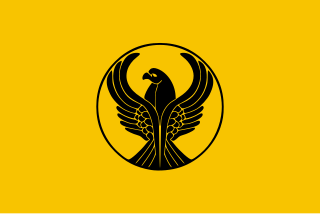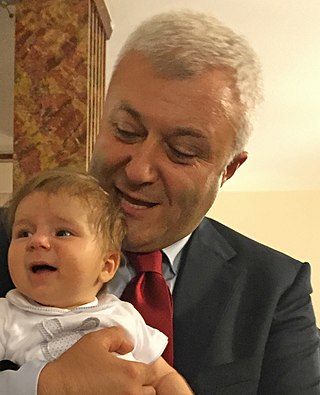
Sinop, historically known as Sinope, is a city on the isthmus of İnce Burun, near Cape Sinope which is situated on the northernmost edge of the Turkish side of the Black Sea coast, in the ancient region of Paphlagonia, in modern-day northern Turkey. The city serves as the capital of Sinop Province.

The Pontic Greeks, also Pontian Greeks or simply Pontians, are an ethnically Greek group indigenous to the region of Pontus, in northeastern Anatolia. Many later migrated to other parts of Eastern Anatolia, to the former Russian province of Kars Oblast in the Transcaucasus, and to Georgia in various waves between the Ottoman conquest of the Empire of Trebizond in 1461 and the Russo-Turkish War of 1828–1829. Those from southern Russia, Ukraine, and Crimea are often referred to as "Northern Pontic [Greeks]", in contrast to those from "South Pontus", which strictly speaking is Pontus proper. Those from Georgia, northeastern Anatolia, and the former Russian Caucasus are in contemporary Greek academic circles often referred to as "Eastern Pontic [Greeks]" or as Caucasian Greeks, but also include the Turkic-speaking Urums.

Sabahattin Ali was a Turkish novelist, short-story writer, poet, and journalist.

The Zincirlikuyu Cemetery is a modern burial ground residing on the European part of Istanbul, Turkey. It is administered by the Metropolitan Municipality. Many prominent figures from the world of politics, business, sports and arts rest here.

Sultanahmet Jail, a former prison in Istanbul, Turkey, is now the luxury Four Seasons Hotel at Sultanahmet. It is located in Sultanahmet neighborhood of Fatih district on the historical peninsula.

Don't Let Them Shoot the Kite is a 1989 Turkish drama film, co-written, co-produced and directed by Tunç Başaran based on a 1986 novella by Feride Çiçekoğlu, featuring Nur Sürer as a female political prisoner who befriends the child of a fellow inmate. The film was screened in competition at the 26th Antalya Golden Orange Film Festival, where it won Golden Oranges for Best Film, Best Actress, Best Screenplay and Best Cinematography, the 10th Mediterranean International Film Festival, where it won 2nd Best Film, and the 8th Istanbul International Film Festival, where it won Best Turkish Film. The film was selected as the Turkish entry for the Best Foreign Language Film at the 62nd Academy Awards, but was not accepted as a nominee.
Mersin İdmanyurdu Sports Club; located in Mersin, east Mediterranean coast of Turkey in 1967–68. Mersin İdmanyurdu (MİY) football team played in Turkish First Football League, the first level division for the first time in 1967–68 season. They finished tenth. In their first season they have become one of the most scorer teams. In Turkish Cup they were eliminated at second round. Before the season MİT had sent an offer to former coach of Turkish national football team Sandro Puppo. However, later Cihat Arman has signed as coach. Bayram Birinci was trainer.
Mersin İdmanyurdu Sports Club; located in Mersin, east Mediterranean coast of Turkey in 1971–72. The 1971–72 season was the fifth season of Mersin İdmanyurdu (MİY) football team in Turkish First Football League, the first level division in Turkey. They finished seventh in the league.
Mersin İdmanyurdu Sports Club; located in Mersin, east Mediterranean coast of Turkey in 1972–73. The 1972–73 season was the sixth season of Mersin İdmanyurdu (MİY) football team in Turkish First Football League, the first level division in Turkey. They finished 11th in the league.
Mersin İdmanyurdu Sports Club; located in Mersin, east Mediterranean coast of Turkey in 1973–74. The 1973–74 season was the sixth season of Mersin İdmanyurdu (MİY) football team in Turkish First Football League, the first level division in Turkey. They have relegated to second division at the end of the season.
The Freedom and Accord Party, also known as the Liberal Union or the Liberal Entente, was a liberal Ottoman political party active between 1911 and 1913, during the Second Constitutional Era. It was the most significant opposition to Union and Progress in the Chamber of Deputies. The political programme of the party advocated for Ottomanism, government decentralisation, the rights of ethnic minorities, and close relations with Britain. In the post-1918 Ottoman Empire, the party became known for its attempts to suppress and prosecute the CUP.

Marmara Prison or officially Marmara Penitentiaries Campus formerly Silivri Prison is a high-security state correctional institution complex in the Silivri district of Istanbul Province in Turkey. Established in 2008, it is the country's most modern and Europe's largest penal facility.
The Ottoman Military College or Imperial Military Staff College or Ottoman Army War College, was a two-year military staff college of the Ottoman Empire. It was located in Constantinople. Its mission was to educate staff officers for the Ottoman Army.

Ahmet Tuncay Özkan is a Turkish journalist, writer and politician. He was arrested on September 27, 2008, in relation to the odatv case of the Ergenekon trials, and in August 2013 he was sentenced to aggravated life imprisonment.

Metris Prison, or officially Metris Closed Penitentiary is a state correctional institution in the Esenler district of Istanbul Province in Turkey. The prison complex consists of two T-type buildings. The current prison director is Zeki Uzun.

Hüseyin Hilmi Bey or İştirakçi (Socialist) Hilmi was one of the early Turkish socialists. He was the founder and first General Chairman of the Ottoman Socialist Party and the Socialist Party of Turkey.
Server Uraz is a Turkish rapper and songwriter. He made his debut as a rapper in 1998 under the nickname Pit10. After using this name for 15 years, he started releasing records under his real name in 2017. Under the name Pit10, he released more than 20 albums. He has been mentioned as an influence for rappers such as Canka, Beta, Flowart, and Deniz Gürzumar.
Zeynep Eronat is a Turkish actress.














